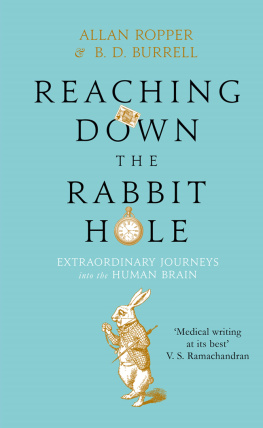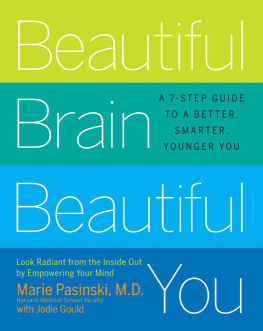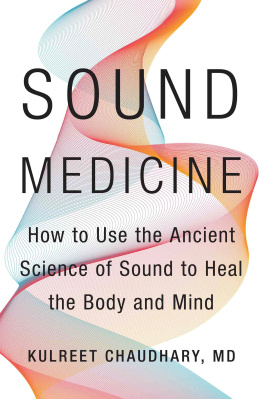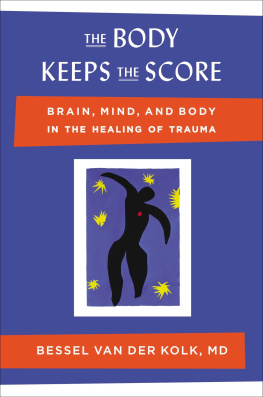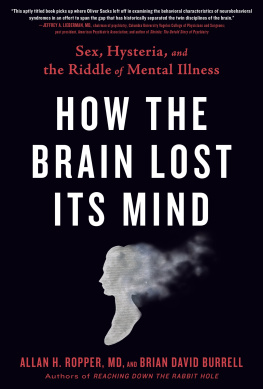REACHING
DOWN THE
RABBIT HOLE

ALSO BY DR. ALLAN H. ROPPER
Principles of Neurology
ALSO BY B. D. BURRELL
The Words We Live By
Postcards from the Brain Museum
First published in hardback in the United States of America in 2014 by St. Martins Press, LLC.
First published in Great Britain in 2014 by Atlantic Books, an imprint of Atlantic Books Ltd.
Copyright Dr. Allan H. Ropper and Brian David Burrell, 2014
The moral right of Dr. Allan H. Ropper and Brian David Burrell to be identified as the authors of this work has been asserted by them in accordance with the Copyright, Designs and Patents Act of 1988.
All rights reserved. No part of this publication may be reproduced, stored in a retrieval system, or transmitted in any form or by any means, electronic, mechanical, photocopying, recording, or otherwise, without the prior permission of both the copyright owner and the above publisher of this book.
1 2 3 4 5 6 7 8 9
A CIP catalogue record for this book is available from the British Library.
Hardback ISBN: 978 1 782 39547 8
Trade Paperback ISBN: 978 1 782 39548 5
EBook ISBN: 978 1 782 39549 2
Printed in Great Britain
Designed by Kathryn Parise
Atlantic Books
An Imprint of Atlantic Books Ltd
Ormond House
2627 Boswell Street
London
WC1N 3JZ
www.atlantic-books.co.uk
CONTENTS

REACHING
DOWN THE
RABBIT HOLE

INTRODUCTION:
The Queen

What neurologists do
Hello, Im Dr. Allan Ropper. How are you?
Thats a grammatical question. Plus and minus.
Is your mind clear?
I guess so. There are a lot of unexplained issues around me, but... Im communicating appropriately.
His name is Dr. Vandermeer. He is in his mideighties, and he is a genuine Boston Brahmin. I know his type well. Over the past fifty years he has built a national reputation as a top-drawer researcher and a caring physician, universally admired, all the while taking somewhat heedless care of his own body. He is a man of arts and sciences, but also a man of tastes and habits acquired from his father and grandfather, which is to say, he is a nineteenth-century Yankee living a twentieth-century life in the twenty-first century, and is only vaguely aware that he can no longer manage in the ten-room house he has occupied for the last fifty-two years. When he retired in his seventies, he settled upon a daily routine that failed to anticipate his declining faculties. He is as unwilling to accept this fact as he is to acknowledge the unruliness of his eyebrows or his surplus of nose and ear hair, a clinical indifference that is not unusual in aging doctors.
Do you know where you are?
At Brigham and Womens Hospital.
The date?
The date? No, I couldnt give you that.
Year?
Again, its such a confusing sequence of events that it has confounded me to where my orientation isnt what it should be.
No problem. Are you in any pain?
No.
Doc Vandermeer was brought here over his own objections after his wife found him sitting on the toilet some seven hours after he had ventured from bedroom to bathroom. He had spent the night there.
Have you had any hallucinations?
I dont think so, but then people generally dont.
Touch. Have you had any convulsions?
No.
And you know about this meningioma in your right temporal lobe? You have a meningioma there about the size of a lemon. Were you aware of that?
Ive had two growth issues that are pertinent. One is in the pancreas and the other is there.
But you seem a little off, cognitively, and our struggle is, could it be the meningioma thats doing it?
As they say, thats your problem.
Hes right. It is my problem. I am his neurologist. It is my job to parse his convoluted responses, fit them into the clinical picture, prioritize his issues, and come up with a plan that lets him live the life that he wants to live, to the extent that is possible. In his peculiar way, he has indicated that he is oriented to his location, but not oriented to the time or to his situation. His highly formalized locution, entirely characteristic of his tribe, may seem quaint, but it is exaggerated just enough to suggest that he is compensating for a language deficit that he is aware of but seems indifferent to. He knows that he has a benign tumor in his pancreas that poses less of a threat than the meningioma in his brain. The brain tumor will not kill him anytime soon, but it will continue to diminish his powers of thought.
Well find out whats what and let you know, I say. Great to meet you.
It will take us some time to sort it all out, but this is a start. Hannah, my senior resident, gives me a nod, signaling that its time to move on to the next patient.
Hello, there. Im Dr. Ropper. Im one of the neurologists. And youve met Hannah Ross, our chief resident. Do you mind if we visit with you?
His name is Gary, and he is one unhappy customer. He is thirty-two years old and has spent more time in hospitals than he cares to recall.
How are you doing? I ask.
I can function, Gary replies listlessly, but not to design specifications.
Interesting phrase. Where did you get that from?
Gene Roddenberry.
It fits. Gary is a computer programmer who has so immersed himself in Star Trek that he knows the Starship Design Specifications by heart. He has the body of a Buddha, the eyes of a koala, and an air of resignation that is probably his baseline. He might as well be wearing a T-shirt emblazoned with the motto: IT IS WHAT IT IS. He has had epilepsy since childhood, culminating in the surgical removal of part of his brain when he was seventeen years old. A U-shaped scar stands out prominently on the left side of his close-cropped scalp. He has enough experience with his condition to know when he needs to go to the hospital, although he would rather not go. When he does, he most definitely does not want to be admitted, but Hannah has admitted him anyway, and there is a lingering animus on his part.
I understand you had several events yesterday, Hannah says. A lot of seizures?
Well, not many for me. Whats considered many?
It all depends on how many is many for you. I was under the impression that you did have many for you... in a row. Is that not true?
No. Even when I have clusters its probably four or five.
Is that what you had yesterday? Four or five?
Well, thats not what brought me to the hospital, if thats what youre getting at.
Gary is in a mood, so Im happy to let Hannah carry the ball. This is her ward, these are her patients, I am the attending physician, and while I took the lead with Dr. Vandermeer in deference to his stature, I now take up a position at the foot of the bed and watch.

